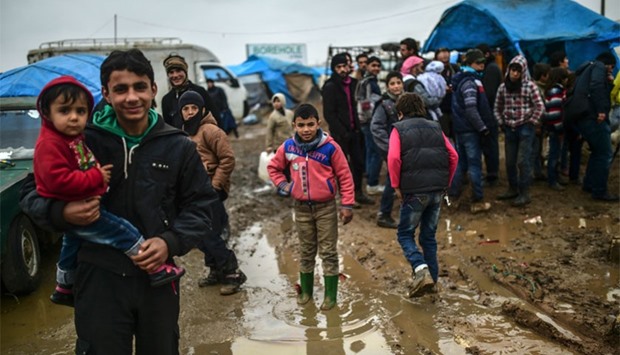Syria's government, for its part, warned it would combat any uninvited foreign ground intervention, following reports that Riyadh and Ankara which support rebel forces could send in troops.
Tens of thousands have escaped fierce fighting as government forces unleashed an advance this week against rebels, severing the opposition's main supply route into the northern metropolis of Aleppo.
On Saturday morning, Turkey's Oncupinar border crossing -- which faces Bab al-Salama on Syrian soil -- remained closed, an AFP correspondent said, as Turkish authorities said they were working to free up space within existing camps to accommodate the latest influx.
"Our teams are ready to provide them with water and food as soon as they arrive," Turkish Red Crescent head Ahmet Lutfi Akar said.
Around 40,000 civilians have fled their homes to escape the regime offensive, according to the Syrian Observatory for Human Rights.
"The situation of the displaced is tragic," said Rami Abdel Rahman, director of the Britain-based monitoring group.
"Families have been sleeping outside in the cold in fields and tents with no international NGO there to help them."
Turkish Foreign Minister Mevlut Cavusoglu reaffirmed on Saturday that his country would keep its "open border policy" for Syrian refugees.
"We still keep this open border policy for these people fleeing from the aggression, from the regime as well as air strikes of Russia," he said.
"We have received already 5,000 of them; another 50,000 to 55,000 are on their way and we cannot leave them there," he said.
EU officials earlier reminded Turkey of its international obligations to keep its frontiers open to refugees.
"The Geneva convention is still valid which states that you have to take in refugees," EU Enlargement and Regional Policy Commissioner Johannes Hahn said.
Warning against intervention
The UN's Office for the Coordination of Humanitarian Affairs (OCHA) said Friday it estimated that up to 20,000 people have gathered at the Bab al-Salama crossing and another 5,000 to 10,000 people displaced to nearby Azaz city.
Turkey is already home to between two and 2.5 million Syrians who have fled their country's brutal five-year conflict.
Aleppo province is one of the main strongholds of Syria's opposition, which is facing possibly its worst moment since the outbreak of war.
Riyadh on Thursday left open the possibility of deploying soldiers, saying it would "contribute positively" if the US-led coalition against the Islamic State (IS) jihadist group in Syria decides on ground action.
Russia has accused Turkey of "preparations for an armed invasion" of Syria, a claim that Ankara has dismissed.
Syria's Foreign Minister Walid Muallem issued a stiff warning against any such intervention.
"Any ground intervention on Syrian territory without government authorisation would amount to an aggression that must be resisted," he said at a news conference in Damascus.
"Let no one think they can attack Syria or violate its sovereignty because I assure you any aggressor will return to their country in a wooden coffin, whether they be Saudis or Turks," he warned.
And the chief of Iran's elite Revolutionary Guards, whose country alongside Russia is a key supporter of the Syrian regime, mockingly said Saudi Arabia wouldn't dare send in ground troops.
"I don't think they would dare do that... If they do, they will inflict a coup de grace on themselves," Major General Ali Jafari said.
On Friday, OCHA spokeswoman Linda Tom said the Aleppo fighting had disrupted major aid and supply routes from the Turkish border.
She said another 10,000 people were thought to have been displaced to the Kurdish town of Afrin, also in northern Aleppo province.
'Access is difficult'
Turkey last faced such an influx in 2014 when 200,000 refugees fled the Syrian Kurdish town of Kobane over three days as IS jihadists and Kurdish fighters battled for its control.
Trucks were seen on Friday carrying tent parts to the refugee camp close to the border gate on the Turkish side, and at least four more were seen returning to Turkey after delivering food in Syria.
A Red Cross spokesman told AFP that efforts were underway to deliver aid to northern Aleppo but warned that "access is difficult".
Aleppo city, Syria's former economic powerhouse, has been divided between opposition control in the east and regime control in the west since mid-2012.
Syria's army has recaptured several key rebel towns in Latakia province and advanced in Aleppo and Daraa since Russia began air strikes on September 30 in support of President Bashar al-Assad.
Western nations have accused the Syrian government of sabotaging UN-backed peace talks that collapsed this week with its military offensive, and Washington has demanded Moscow halt its air war.
Top diplomats from countries trying to resolve the conflict are set to meet again next week after UN envoy Staffan de Mistura suspended the floundering Geneva negotiations until February 25.
More than 260,000 people have died in Syria's conflict and more than half the population has been displaced.

